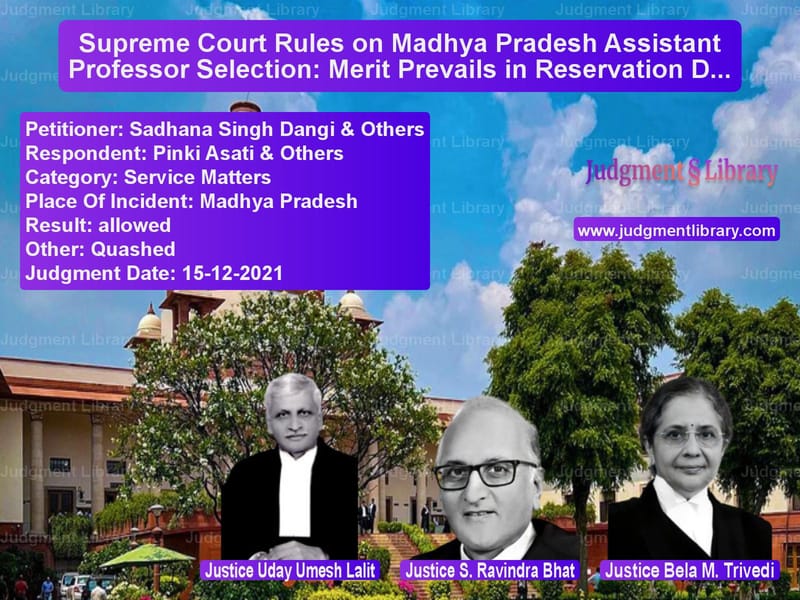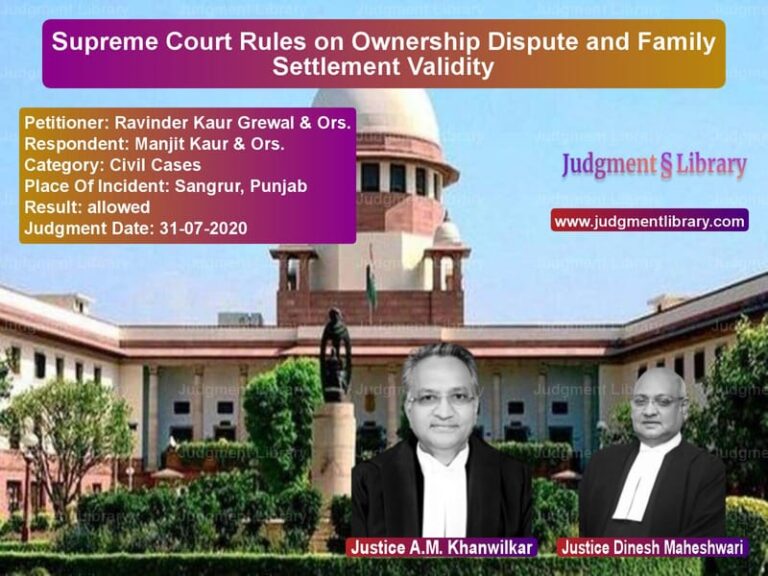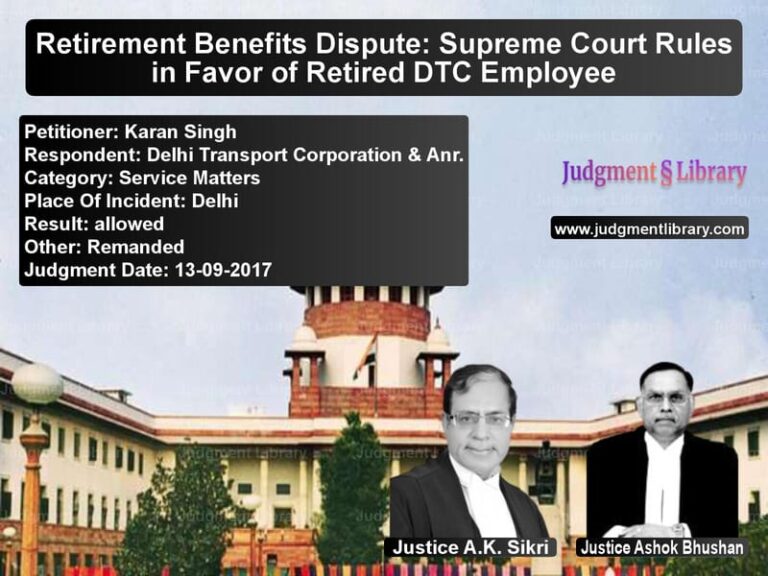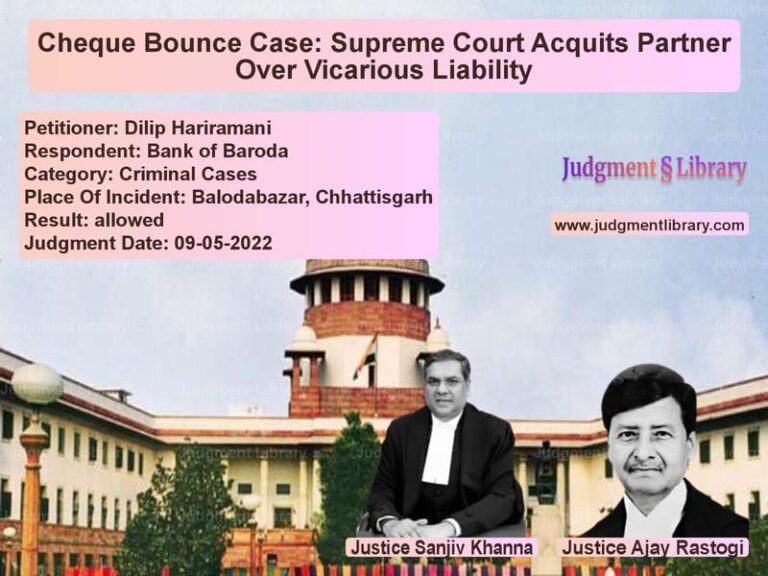Supreme Court Rules on Madhya Pradesh Assistant Professor Selection: Merit Prevails in Reservation Dispute
The Supreme Court of India recently adjudicated on a critical issue concerning the application of horizontal reservation in the selection of Assistant Professors in Madhya Pradesh. The case, Sadhana Singh Dangi & Others vs. Pinki Asati & Others, arose from disputes related to the revised selection list published by the Madhya Pradesh Public Service Commission (MPPSC). The Court’s verdict reaffirmed the principle that merit must take precedence, even within reserved categories, when applying horizontal reservations.
Background of the Case
The controversy stemmed from the 2017 Assistant Professor recruitment process conducted by the MPPSC. Initially, a selection list was published, which was later revised following multiple objections. The revised list led to a legal challenge in the High Court of Madhya Pradesh, where the petitioners contended that the new selection process had misapplied horizontal reservation, particularly in the case of Other Backward Classes (OBC) female candidates. The High Court ruled against the revised list, prompting appeals to the Supreme Court.
Key Legal Issues
- Whether candidates from reserved categories who qualify on merit should be counted within their reserved quota or adjusted in the unreserved category.
- Whether the principle of horizontal reservation should be compartmentalized, preventing reserved category candidates from competing for unreserved slots.
- Whether the MPPSC had correctly applied the reservation rules when finalizing the revised selection list.
Petitioners’ Arguments
- The petitioners argued that reserved category candidates (OBC females) should not be counted within the unreserved female quota (UNRF).
- They contended that the revised selection process violated the principles of horizontal reservation, as outlined in Rule 3 of the Madhya Pradesh Civil Services (Reservation for Women) Rules, 1997.
- The petitioners claimed that counting OBC females in the unreserved category disadvantaged general category female candidates, who would have otherwise secured those positions.
Respondents’ Arguments
- The State of Madhya Pradesh and the MPPSC argued that reservation principles must prioritize merit, allowing OBC female candidates who performed exceptionally well to be counted in the unreserved category.
- They cited the Supreme Court’s landmark ruling in Saurav Yadav & Others vs. State of Uttar Pradesh, which held that candidates from reserved categories who qualify on merit should be adjusted in the unreserved category.
- The respondents contended that the revised selection list had been prepared in line with constitutional principles and relevant case law.
Supreme Court’s Verdict
The Supreme Court, in a bench comprising Justices Uday Umesh Lalit, S. Ravindra Bhat, and Bela M. Trivedi, ruled in favor of the State of Madhya Pradesh and MPPSC. The Court reaffirmed its position from Saurav Yadav, emphasizing:
“The law laid down in Saurav Yadav is very clear that even while applying horizontal reservation, the merit must be given precedence and that if the candidates who belong to SCs, STs and OBCs have secured higher marks or are more meritorious, they must be considered against the seats meant for unreserved candidates.”
Key Observations by the Supreme Court
- The Court ruled that OBC female candidates who performed well enough to qualify on merit should be included in the unreserved female category.
- The Court criticized the High Court’s ruling, stating that it had incorrectly applied compartmentalized horizontal reservation, leading to unjustified exclusion of meritorious candidates.
- It emphasized that the principle of “migration” applies to horizontal reservation as well, meaning that candidates qualifying on merit must be accommodated in the unreserved category.
The Court concluded:
“The observations made by the High Court in the instant case do not lay down the correct law. The High Court failed to appreciate that conceptually there would be no distinction between vertical and horizontal reservations when it comes to the basic idea that even the candidates belonging to reserved categories can as well stake a claim to seats in unreserved categories if their merit position entitles them to do so.”
Final Order
- The Supreme Court set aside the High Court’s order and reinstated the revised selection list published by the MPPSC.
- The Court ruled that all appointments made from the revised list would stand valid.
- It directed that candidates affected by delays in their appointment be granted deemed seniority and all consequential benefits.
Key Takeaways
- Merit takes precedence: The ruling reinforces the principle that candidates from reserved categories who qualify on merit should be considered for unreserved seats.
- Horizontal reservation does not mean compartmentalization: The Court clarified that candidates qualifying on merit should not be restricted to their reserved categories.
- Administrative consistency: The judgment aligns MPPSC’s selection process with constitutional principles and previous Supreme Court rulings.
- Impact on future recruitment: The ruling provides clarity for future selection processes across various states, ensuring that reservation rules do not unfairly disadvantage meritorious candidates.
This landmark judgment serves as a guiding principle for recruitment processes, reinforcing fairness, meritocracy, and clarity in the application of reservation policies in public employment.
Petitioner Name: Sadhana Singh Dangi & Others.Respondent Name: Pinki Asati & Others.Judgment By: Justice Uday Umesh Lalit, Justice S. Ravindra Bhat, Justice Bela M. Trivedi.Place Of Incident: Madhya Pradesh.Judgment Date: 15-12-2021.
Don’t miss out on the full details! Download the complete judgment in PDF format below and gain valuable insights instantly!
Download Judgment: sadhana-singh-dangi-vs-pinki-asati-&-others-supreme-court-of-india-judgment-dated-15-12-2021.pdf
Directly Download Judgment: Directly download this Judgment
See all petitions in Recruitment Policies
See all petitions in Public Sector Employees
See all petitions in Employment Disputes
See all petitions in Judgment by Uday Umesh Lalit
See all petitions in Judgment by S Ravindra Bhat
See all petitions in Judgment by Bela M. Trivedi
See all petitions in allowed
See all petitions in Quashed
See all petitions in supreme court of India judgments December 2021
See all petitions in 2021 judgments
See all posts in Service Matters Category
See all allowed petitions in Service Matters Category
See all Dismissed petitions in Service Matters Category
See all partially allowed petitions in Service Matters Category







